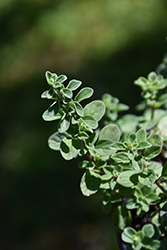Height: 24 inches
Spacing: 20 inches
Sunlight:
![]()
Hardiness Zone: 9a
Other Names: Majorana hortensis
Description:
This variety is noted for its mild, delicate flavor and pleasant aroma; does well in sandy loam, good heat and drought tolerance; a perfect addition to the herb garden, and is also great for containers
Edible Qualities
Sweet Marjoram is a perennial herb that is commonly grown for its edible qualities. The fragrant oval grayish green leaves are usually harvested from late spring to late summer. The leaves have a mild taste and a sweet fragrance.
The leaves are most often used in the following ways:
- Fresh Eating
- Cooking
- Seasoning
Features & Attributes
Sweet Marjoram features tiny white tubular flowers with shell pink overtones from mid to late summer. Its fragrant oval leaves remain grayish green in colour throughout the year. The brick red stems can be quite attractive.
This is an herbaceous evergreen perennial herb with an upright spreading habit of growth. It brings an extremely fine and delicate texture to the garden composition and should be used to full effect. This is a relatively low maintenance plant, and should be cut back in late fall in preparation for winter. It is a good choice for attracting bees and butterflies to your yard, but is not particularly attractive to deer who tend to leave it alone in favor of tastier treats. It has no significant negative characteristics.
Aside from its primary use as an edible, Sweet Marjoram is sutiable for the following landscape applications;
- Border Edging
- General Garden Use
- Groundcover
- Herb Gardens
- Container Planting
Planting & Growing
Sweet Marjoram will grow to be about 24 inches tall at maturity, with a spread of 24 inches. When grown in masses or used as a bedding plant, individual plants should be spaced approximately 20 inches apart. Its foliage tends to remain dense right to the ground, not requiring facer plants in front. It grows at a fast rate, and under ideal conditions can be expected to live for approximately 5 years. As an evegreen perennial, this plant will typically keep its form and foliage year-round.
This plant can be difficult to integrate into a landscape or flower garden, and is best grown in a designated herb garden. It should only be grown in full sunlight. It prefers dry to average moisture levels with very well-drained soil, and will often die in standing water. It is considered to be drought-tolerant, and thus makes an ideal choice for a low-water garden or xeriscape application. It is not particular as to soil pH, but grows best in sandy soils. It is somewhat tolerant of urban pollution. This species is not originally from North America. It can be propagated by cuttings.
Sweet Marjoram is a good choice for the edible garden, but it is also well-suited for use in outdoor pots and containers. With its upright habit of growth, it is best suited for use as a 'thriller' in the 'spiller-thriller-filler' container combination; plant it near the center of the pot, surrounded by smaller plants and those that spill over the edges. It is even sizeable enough that it can be grown alone in a suitable container. Note that when growing plants in outdoor containers and baskets, they may require more frequent waterings than they would in the yard or garden.
Disclaimer - This resource is provided for informational purposes only and does NOT reflect current availability. Inventory varies seasonally, so we cannot guarantee that every plant will be in stock at all times - please contact your favourite GardenWorks location directly for current availability. It does not include our entire inventory of plants, so be sure to visit GardenWorks to see varieties that may not be represented on this list.

